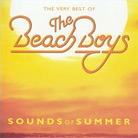July 2003
For a long time, I shared that skepticism. Although I felt from the first time I heard it that "Good Vibrations" was a great record and reason enough to trust the claims of Brian Wilson’s genius, I suspected these guys were a bunch of squares. Their vocal inspiration, after all, was the '50s group the Four Freshmen (Wilson remains a fan to this day). Besides, they sang about cars, pretty girls, and surfing -- and Jimi Hendrix assured us in 1967 that, "You’ll never hear surf music again." It was Pet Sounds that made me a believer -- in Pet Sounds, at least. A friend gave me a copy of the CD about a dozen years ago and, to be honest, I didn’t play it until he insisted. "It’s a great record," he said. "But it’s the Beach Boys. I know Brian Wilson’s a great producer, but.…" I had heard that Paul McCartney cited it as an inspiration for Sgt. Pepper’s, and Paul doesn’t throw compliments around freely. I finally played it and I was, if not hooked, mighty impressed. Pet Sounds took the group’s soaring harmonies and Wilson’s painstaking production methods and put them to songs about life and its difficulties. Sure, they were Brian Wilson’s difficulties, but his insecurities were everyone’s. It took me a while to I realize how much of Wilson’s talent was also in all those singles I’d heard through the years, but Sounds of Summer: The Very Best of the Beach Boys sealed it for me. The mastering is clear and sharp, and the small, carefully chosen details that Wilson used to build his recordings are much easier to hear than in previous CD releases, which sounded a little blurry. "California Girls," to use just one example, opens with a 12-string guitar playing a melody in tandem with a six-string, and they are soon joined by a solid bass line and a series of splashes from the bell of a cymbal. In the third bar, a slightly dissonant note from a saxophone plays in the background and the rest of the reed section joins in the next bar with a lower chord that sounds like it shouldn’t work -- but it does. For Wilson, it was the accumulation of these touches that counted. It might be the brief guitar and organ lines played behind the hand claps in "I Get Around" or the accordion on "Wouldn’t It Be Nice" (really), but things that alone might seem insignificant or even questionable contribute to an overall effect that Wilson was trying to achieve. Phil Spector was one of Wilson’s heroes, and Wilson also layered his productions with sound. But the Beach Boys’ records have more space and sunlight in them. Purists will question the choice of stereo masters over mono here, and anyone with taste will dispute the inclusion of "Kokomo." In the end, however, this disc reminds you of how many good songs the Beach Boys recorded and how well they responded to the challenges presented to them by the British invasion and Motown. Some of these songs, especially "I Can Hear Music" (which Brain’s brother, Carl, produced) and "Do It Again," are as good as anything from the late '60s. The title reinforces the idea that the Beach Boys represent an ideal of an eternal carefree summer. Many of these songs carry more emotional weight than that. On "When I Grow Up (To Be a Man)" Wilson asked:
I may not dig some of those sounds that I did when I was a kid, but as I’ve grown older I’m glad I’ve learned to appreciate what the Beach Boys have given us. GO BACK TO: |
 The Beach Boys - Sounds
of Summer: The Very Best of the Beach Boys
The Beach Boys - Sounds
of Summer: The Very Best of the Beach Boys The Beach Boys
began recording in 1962, at around the same time as the Beatles, yet they always seem to
be from an earlier time. Classic-rock stations never play them, and their heavy rotation
on oldies radio only serves to reinforce the notion for some that they’re part of
rock’s dopey Bobby Rydel/Fabian wing. If you ask a classic-rock fan in his 20s if
he’s ever heard of Pet Sounds, you’ll be met with a blank stare. Tell him
it’s by the Beach Boys and he’ll scoff.
The Beach Boys
began recording in 1962, at around the same time as the Beatles, yet they always seem to
be from an earlier time. Classic-rock stations never play them, and their heavy rotation
on oldies radio only serves to reinforce the notion for some that they’re part of
rock’s dopey Bobby Rydel/Fabian wing. If you ask a classic-rock fan in his 20s if
he’s ever heard of Pet Sounds, you’ll be met with a blank stare. Tell him
it’s by the Beach Boys and he’ll scoff.